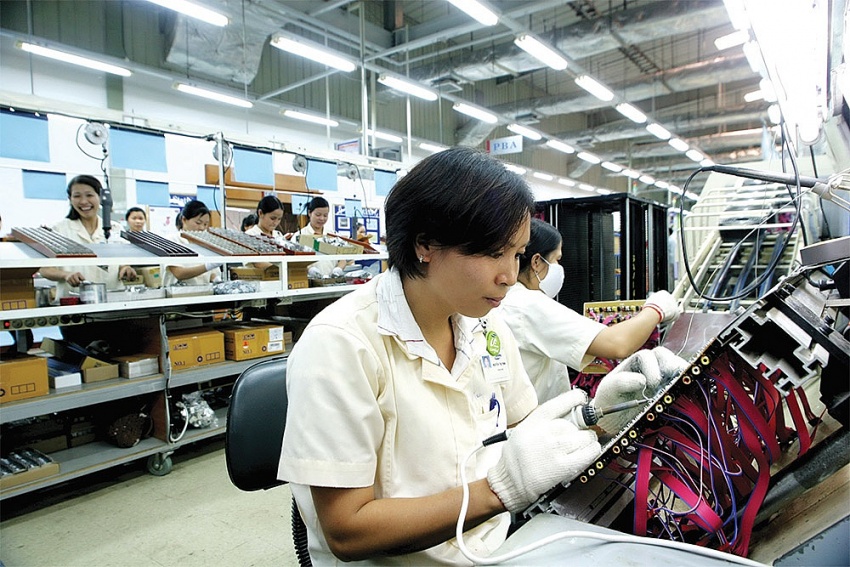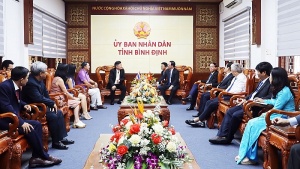Producers eager for eco-impact rules
 |
| Electronic waste is becoming a rising worry for businesses, photo Le Toan |
One large-scale manufacturer in the electrical industry in the northern province of Bac Giang, in operation for many years, has been granted an environmental licence according to the Law on Environmental Protection 2020 (LEP). Now the company plans to expand the project scale to produce about six million products per year. However, it has struggled with environmental impact assessment (EIA) permits, which have to cover numerous aspects.
“The procedures have become difficult and take a lot of time and cost. We have to submit it to the Ministry of Natural Resources and Environmental (MoNRE), instead of the provincial authority,” said Nguyen Thu Huyen, director of the company. “We would like to accelerate the procedures of expanding the factory to set up and start manufacturing. Numerous orders are waiting for us.”
As of 2022, amendments to the LEP have strengthened the licensing authority for EIAs. The authority has shifted from provincial levels to the central government agency, the MoNRE, based on the potential for pollution, production quantities, and related factors.
“As a result, the time and cost of obtaining permits for EIAs have increased, placing a burden on business operations for companies,” said Hong Sun, chairman of the Korean Chamber of Commerce and Industry in Vietnam.
According to Decree No.08/2022/ND-CP on the elaboration of several articles of the LEP, its appendix lists types of productions, businesses, and services likely to cause environmental pollution.
“However, even for items that do not cause environmental pollution, if the production quantity exceeds the specified threshold (1,000 tonnes or one million units), a permit from the ministry rather than the provincial authority is required,” Sun said.
Additionally, for factory expansion through additional investment or new investments, approval from the central government is necessary if the conditions are exceeded. Therefore, in the electrical and electronic industries, many South Korean manufacturers of electronic components often exceed a monthly production quantity of one million units.
“Consequently, new entrants or companies seeking to expand their investments, who fall under this category, must undergo EIAs, leading to concerns about excessive time and cost,” Sun claimed. “Delays in obtaining permits are causing disruptions in the production schedules of factories.”
Currently, the evaluation process has become more streamlined compared to the early stages of legal enforcement. However, the reality is that the EIA takes a minimum of two months, and the documentation required for permits has increased by more than 50 per cent compared to the documents submitted for provincial-level permits.
Specifically, for the existing EIA review and approval process, dossiers have to be submitted to the provincial departments of planning and investment and industrial zone management boards, then transferred to the provincial departments of natural resources and environment, final review by the provincial people’s committees, and final assessment approval. This poses a hindrance to the swift investment activities of companies.
“While South Korean companies fully respect the Vietnamese government’s efforts in environmental pollution prevention and management, it is strongly believed that reducing the excessive administrative processing costs and time for permits aligns not only with promoting foreign investment in Vietnam but also with the government’s direction towards administrative procedure reforms,” Sun said.
Environmental impacts are always a source of concern at manufacturing projects, including noise, dust, wastewater, and emissions pollution, as well as overuse of natural resources, land, and water.
Last week, Phu Yen People’s Committee sanctioned Phu Yen Tapioca Starch JSC with an administrative penalty of over $140,000 for six violations of environmental protection and natural resources.
In the electrical and electronic industries, waste is becoming an increasing concern. According to the fourth Global E-Waste Monitoring report from the UN Institute for Training and Research, released on March 20, the annual generation of e-waste globally is rising by 2.6 million tonnes annually, on track to reach 82 million tonnes by 2030.
 | Thai billionaire plans factory to extract gold from electronic waste in Binh Dinh Thai billionaire Peter Palanugool has expressed an interest in developing a project to process gold from electronic waste in the central province of Binh Dinh. |
What the stars mean:
★ Poor ★ ★ Promising ★★★ Good ★★★★ Very good ★★★★★ Exceptional
Related Contents
Latest News
More News
- State corporations poised to drive 2026 growth (February 03, 2026 | 13:58)
- Why high-tech talent will define Vietnam’s growth (February 02, 2026 | 10:47)
- FMCG resilience amid varying storms (February 02, 2026 | 10:00)
- Customs reforms strengthen business confidence, support trade growth (February 01, 2026 | 08:20)
- Vietnam and US to launch sixth trade negotiation round (January 30, 2026 | 15:19)
- Digital publishing emerges as key growth driver in Vietnam (January 30, 2026 | 10:59)
- EVN signs key contract for Tri An hydropower expansion (January 30, 2026 | 10:57)
- Vietnam to lead trade growth in ASEAN (January 29, 2026 | 15:08)
- Carlsberg Vietnam delivers Lunar New Year support in central region (January 28, 2026 | 17:19)
- TikTok penalised $35,000 in Vietnam for consumer protection violations (January 28, 2026 | 17:15)

 Tag:
Tag:


















 Mobile Version
Mobile Version